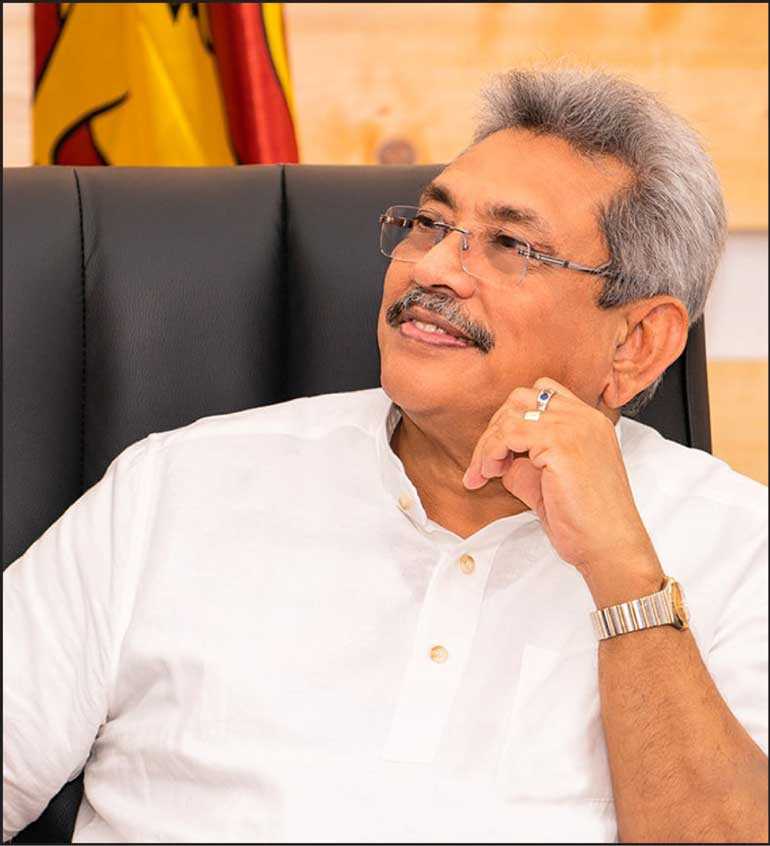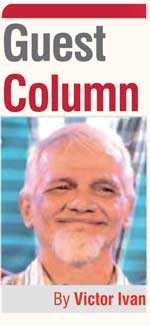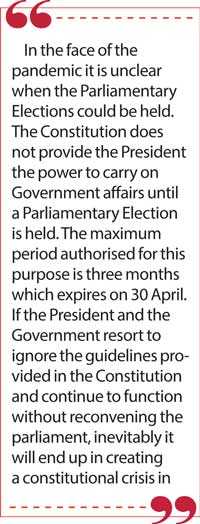Wednesday Feb 25, 2026
Wednesday Feb 25, 2026
Friday, 17 April 2020 00:00 - - {{hitsCtrl.values.hits}}

It is evident that the ethnic and religious divisions growing in society amidst the COVID-19 pandemic have led to weakening the capacity to control the impact of this deadly virus while exacerbating the  danger and the damage caused by it.
danger and the damage caused by it.
This wave of ethnic and religious divisions that has raised its ugly head following the outbreak of COVID-19 pandemic can be considered as another kind of epidemic deliberately created and pursued rather than a spontaneous occurrence.
It is interesting to recall that ethnic or religious divisions did not come to the fore when Sri Lanka was struck by the tsunami in December 2004. The people of Sri Lanka faced the tsunami threat collectively and with a common national sentiment free from ethnic or religious emotions. The distortion caused in Sri Lanka’s social system since then, for nearly 15 years, is enormous.
The current pandemic situation has distorted the system of governance of the country which in turn has disturbed and disrupted the control of the pandemic. Despite major legal flaws in the 19th Amendment and the manner in which it was enacted, whatever may be the reasons, with the support of the Opposition as well, it was made a legislation which resulted in effecting major changes in the sphere of presidential powers.
The main purpose of the 19th Amendment was to remove the Executive powers of the President except the monetary power of the Republic which he held and vest those powers in the Parliament and make the President’s role nominal. By the time the 19th Amendment was introduced, both the executive presidential system and the parliamentary system had become extremely corrupt entities.
It was without making necessary reforms conducive to rectifying the corrupt institutional structures of the Parliament that the President had been deprived of the Executive powers and transferred them to the Parliament. It can be considered the biggest weakness inherent in the underlying philosophy of the 19th Amendment.
Although I published my views on the 19th amendment at the time of its introduction pointing out its major flaws and likely repercussions, the key people who advocated the constitutional amendment were not inclined to pay their attention to them and rectify the serious error that it was going to make. The Yahapalana regime was only interested in removing the presidential powers and vesting them in Parliament. It was not interested in changing the corrupt institutional structures that had overwhelmed the State power.
Usually, a nominal president is elected on the recommendation of the prime minister or by the vote of a limited body exclusively appointed for the purpose. However, the 19th Amendment did not change the system of electing the president. Consequently, the system of electing the nominal president who does not possess Executive powers remained unchanged and the old system in which the executive president was elected by public vote in a Presidential Election held treating the whole country a single constituency, continued. This was a serious flaw inherent in the 19th Amendment.
For whatever reason, the changes made in the sphere of the presidential powers were not subjected to public discussion. Not a single professor of political science ventured to explain to the country the changes made in the powers of the executive presidency. For whatever reason, the founders of the 19th Amendment refrained from elaborating the change made or expressing their views about it.
As such, not only the general public, but also the politicians themselves did not have a proper understanding of the change effected in the sphere of presidential powers. The impression they all shared had been that though certain powers of the president had been removed, Executive power still remained with him.
The level of confusion prevailing on this issue had been so high that I was amazed to listen to the promises made during the pre-nomination period by the candidates running for the Presidential Election on what they were going to do upon being elected. This situation prompted me to write a few articles questioning as to how a president without Executive powers would make such promises. Perhaps this must be the first socio-political dialogue initiated to emphasise that the next president would only be a nominal head of State with no Executive powers.
Subsequently, Nihal Jayawickrema, an expert on the subject of constitutionalism wrote an article on the 19th Amendment explaining that the next president had no Executive powers and that he would only be a nominal head of State similar to President William Gopallawa, the first Non-Executive President of Sri Lanka from 1972-1978.
The article published by Nihal Jayawickrema can be considered the first instance in which an eminent scholar on the subject of Constitutional Law had correctly clarified the effects of the 19th Amendment. Even his clarification cannot be described to have completely eliminated the confusion that existed in the political field and among the public of the status of the president subsequent to the enactment of the 19th Amendment.
Communalism on the spree
The defeat of President Mahinda Rajapaksa in the 2015 Presidential Election astonished the Sinhala supporters of his party. They perceived it as an occasion in which a small section of Sinhalese people in the south had defeated their leader with the support of the minority community groups.
In order to prevent recurrence of this situation, the theorists of his political force ventured to focus on a methodology that could win power only through the votes of the majority Sinhala people. They knew that a powerful enemy should be brought to the fore if the majority Sinhalese were to be motivated and inspired. Probably they must have realised the need for finding a new enemy as the old enemy – the Tamils symbolised by Prabhakaran – had been already defeated. It was probably to fulfil this need that the Muslim community was picked up and brought to the fore in the form of a new enemy.
If Muslims, on account of them being a minority community, had taken the side of Prabhakaran at the separatist war, defeating the latter would have become an extremely difficult task. But, the Muslims of the east appeared against Tamil separatism. They had to pay a bigger price for it and the Muslims in the north were expelled from areas where they lived.
Yet, ignoring all good things of Muslims, malicious and unfounded rumours causing hatred and disgust against them were fabricated and disseminated. The rumours on the use of some sterilising pills by Muslim traders ostensibly to make the Sinhalese an extinct nation can be considered a story which had made a strong impact on the psyche of Sinhala society. Though the Yahapalana regime did not take part in this anti-Muslim propaganda, it however covertly supported it through the adoption of a policy that did not oppose the campaign of rumour mongering.
Though the suicide bomb attacks launched by Muslim extremist youth groups on Easter Sunday were targeted at Catholics and Christians, this horrendous incident exacerbated the hateful attitudes that had been growing among the Sinhalese people against Muslims to a maximum level. It offered Gotabaya Rajapaksa a solid platform to win the Presidential Election with Sinhala votes only.
The mess of the aspiration
Defending Sinhala Buddhist aspirations and making Sri Lanka a developed country like Singapore can be said to be the sole aspiration of the pioneers of the Sinhala Buddhist movement that brought Gotabaya Rajapaksa into power. They wanted to make him the sole leader of the country having absolute power. But, there was a big confusion in this aspiration. Apparently, none of them were aware that the 19th Amendment had deprived the President of his Executive power and made him a nominal president.
As expected by Sinhala Buddhist forces, Gotabaya Rajapaksa was able to achieve a massive victory based on Sinhala Buddhist votes without having to depend on the Tamil and Muslim votes. But the presidency that he won was not a powerful post with Executive powers. It was only after the election victory that even the pioneers of the Presidential Election realised that it was no longer the most powerful Executive presidency it once was.
Having lost the initial hopes cherished by them they ventured to set new expectations which entailed securing a two-thirds majority in Parliament composed of a team of enlightened and educated parliamentarians loyal to the President and with their support to abolish the 19th Amendment and restore the old Executive presidential system.
Following the Presidential Election, the defeated group voluntarily relinquished its power and handed over the ruling power to the victorious group which did not have a majority in the Parliament. The new Government being a temporary caretaker regime purported to be maintained until the next General Election, there was no need to present a budget for the approval by the Parliament. Yet, it became necessary to have a supplementary estimate approved to cover the expenditure required for the administration of the country until the elections.
However, the Government of its own accord withdrew the proposal of the supplementary estimate, fearing that the Opposition might defeat it. But the Opposition did not state that it would defeat the supplementary estimate when it was submitted. However, in this backdrop the Government has been compelled to pursue its affairs without constitutionally-allocated funds.
The constitutional crisis
The issue of not having funds approved by the Parliament had also led to the dissolution of Parliament prior to the completion of its official term. The President mentioned it in his address to the nation. He further stated that the issue of whether the Parliamentary Election can be held or not was not important to him; and he also mentioned that after the Parliament was dissolved and the nominations were received, the President would be entitled to allocate funds needed to run the country. The President’s opinion is correct. However, according to the Constitution, the President has this power only until 30 April.
The President dissolved the Parliament on 2 March and the Commissioner of Elections received nominations on the date that he had fixed (18 March) and postponed the date fixed for the election (25 April) in view of the prevailing pandemic atmosphere in the country. Thereafter the Elections Commissioner sent a letter to the President stating that it was advisable to seek the guidance of the Supreme Court as there was no possibility of holding an election by the end of May. It could be considered the ideal decision the Commissioner of Elections could have made at this stage.
As per Article 70 (7) of the Constitution quoted below, the President may, if necessary, reconvene the Parliament: “If at any time after the dissolution of Parliament the President is satisfied that an emergency has arisen of such a nature that an earlier meeting of Parliament is necessary, he may by Proclamation summon the Parliament which has been dissolved to meet on a date not less than three days from the date of such Proclamation and such Parliament shall stand dissolved upon the termination of the emergency or the conclusion of the General Election, whichever is earlier.”
The Supreme Court should be consulted if there is any doubt or ambiguity in regard to reconvening the Parliament.
But neither the President nor the Government seem to be willing to reconvene the Parliament. It does not seem prepared to consult the Supreme Court either in this respect. In terms of Article 76 (1) of the Constitution, the legislative power of Parliament shall not be abdicated or in any manner alienated.
In the face of the pandemic it is unclear when the Parliamentary Elections could be held. The Constitution does not provide the President the power to carry on Government affairs until a Parliamentary Election is held. The maximum period authorised for this purpose is three months which expires on 30 April. If the President and the Government resort to ignore the guidelines provided in the Constitution and continue to function without reconvening the parliament, inevitably it will end up in creating a constitutional crisis in addition to the crisis created by the coronavirus.
Preventing a constitutional crisis
At this juncture, apparently, the President and his Government are not in favour of reconvening the Parliament because the Government does not have the majority in the Parliament. The Government appears to be worried over the situation that may arise in the event the Opposition attempts to seize ruling power when the Parliament is reconvened. It can be considered as a reasonable doubt.
Preventing the emergence of an unconstitutional and arbitrary rule is an important national requirement; the struggle for political power in the face of a terrible pandemic situation will not augur well for the common good of the country. If the Government is unwilling to reconvene the Parliament for fear of not having a majority in the Parliament, it would be possible for the Opposition to give a guarantee to the Government to support its activities until the Parliamentary Elections.
The Government must realise that the catastrophic pandemic situation is not confined only to a health issue that determines the lives and deaths of the people. There is an economic side to it. The main sources of income for the Government have collapsed. Millions are destined to lose their livelihood. It is necessary to have political coordination and ethnic and religious harmony to overcome this disastrous challenge.
The Parliamentary Election must be postponed until the crisis is over. The Parliament should be reconvened. The ruling party as well as the Opposition must give up the political power struggle until the crisis is over. Both parties should make a public statement on it. The Opposition should adopt a policy of supporting the Government irrespective of the fact that it has no majority in the Parliament, without compromising the parliamentary decision-making process. The Opposition should give an assurance to the Government in this respect.
The decision-making process must be brought to a broader national framework without confining it to a narrow political agenda. It must be a transparent and accountable process open to the people and functioning within the precincts of democratic milieus. It is important that not only the physical side of the problem but also the economic and social aspects of it must be taken into account in dealing with the crisis. The crisis, while minimising the damage caused by it, should be turned into an important opportunity to lift Sri Lanka to better heights.